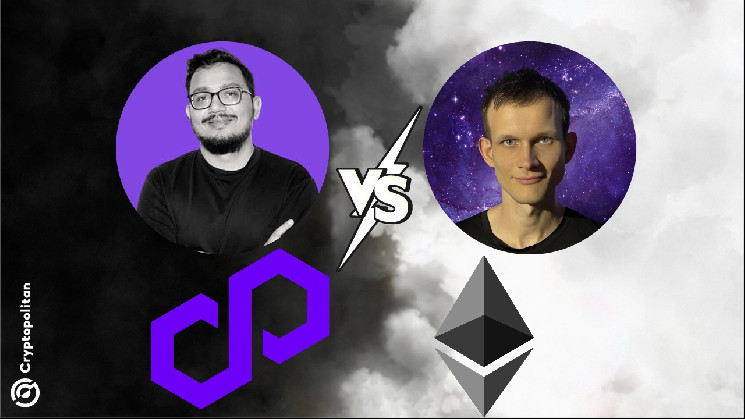Polygon’s Sandeep Nailwal thinks Vitalik Buterin doesn’t like Polygon POS, wants to know why

Sandeep Nailwal, co-founder of Polygon, is trying to crack a mystery. He wants to know why Vitalik Buterin, Ethereum’s co-founder, has stayed silent about Polygon PoS, a network that has arguably done more for Ethereum adoption than any other.
Sandeep vented on X, saying, “Chain Yoda asked me why Ethereum’s social layer resisted PoS instead of supporting it… why Vitalik himself has endorsed Solana as a community of builders but almost never Polygon PoS.”
Sandeep didn’t have an answer. Instead, he pointed to a mindset problem: “Our bias towards adopting and indisposition towards Definitions.”
Polygon PoS has grown into one of Ethereum’s most crucial extensions. Yet, Sandeep feels the Ethereum elite doesn’t acknowledge its value, raising questions about favoritism and priorities in the blockchain world.
What makes Polygon PoS “great?”
The team claims Polygon PoS has one job—making Ethereum better. The network slashes transaction fees to just $0.015 on average, about 10,000 times cheaper than Ethereum’s mainnet costs.
It handles transactions off the main Ethereum chain, processes them on its sidechain, and then finalizes them on Ethereum. This system reduces congestion and gas fees, making the Ethereum ecosystem more accessible.
What makes Polygon PoS stand out is its Ethereum Virtual Machine (EVM) compatibility. Developers don’t have to rewrite their dApps to migrate from Ethereum.
Instead, they can use the same tools and frameworks. That convenience has drawn thousands of developers to Polygon, boosting Ethereum’s ecosystem without much extra work from Ethereum’s core team.
Security is another strong point. Polygon PoS uses a Proof of Stake model where validators and delegators secure the network. Validators verify transactions, while delegators stake their tokens to back them. The setup keeps the network decentralized and resistant to attacks.
Technically, the network has two core layers. Heimdall handles governance and staking. Bor focuses on block production, ensuring transactions flow smoothly to Ethereum’s mainnet. Together, they provide the backbone for a system that reportedly supports over 3 million daily transactions and holds $5 billion in assets.
Vitalik: A Solana fan?
Sandeep’s frustration is also about Vitalik’s apparent preference for Solana, a competing blockchain. Vitalik has openly praised Solana’s resilience and its community of builders.
After the collapse of FTX, which hit Solana hard, Vitalik shared optimism, saying the network’s real builders would thrive without opportunistic players.
Vitalik has called Solana a “worthy competitor” to Ethereum. He likes its ability to decentralize effectively, citing its high Nakamoto coefficient. This measure indicates how distributed Solana’s validator network is, and Vitalik believes it’s a step in the right direction.
But that doesn’t mean Vitalik is blind to Solana’s flaws. He’s criticized its centralization, saying running a Solana node is far more complicated than running one on Ethereum. That complexity limits participation, making the network less decentralized.
He has also pointed out that Solana’s focus on speed and efficiency comes at the expense of decentralization, Ethereum’s core principle.
And clearly, Sandeep believes the Ethereum community has a bias toward abstract principles like decentralization definitions.
Land a High-Paying Web3 Job in 90 Days: The Ultimate Roadmap



 Bitcoin
Bitcoin  Ethereum
Ethereum  Tether
Tether  Dogecoin
Dogecoin  USDC
USDC  Cardano
Cardano  TRON
TRON  Chainlink
Chainlink  Hedera
Hedera  Stellar
Stellar  Bitcoin Cash
Bitcoin Cash  LEO Token
LEO Token  Litecoin
Litecoin  Cronos
Cronos  Ethereum Classic
Ethereum Classic  Monero
Monero  Dai
Dai  Algorand
Algorand  OKB
OKB  Cosmos Hub
Cosmos Hub  Stacks
Stacks  Theta Network
Theta Network  Gate
Gate  Maker
Maker  Tezos
Tezos  KuCoin
KuCoin  Zcash
Zcash  IOTA
IOTA  NEO
NEO  Polygon
Polygon  Synthetix Network
Synthetix Network  Tether Gold
Tether Gold  Dash
Dash  TrueUSD
TrueUSD  Holo
Holo  Zilliqa
Zilliqa  0x Protocol
0x Protocol  Enjin Coin
Enjin Coin  Basic Attention
Basic Attention  Qtum
Qtum  Siacoin
Siacoin  Ravencoin
Ravencoin  Decred
Decred  NEM
NEM  Ontology
Ontology  DigiByte
DigiByte  Nano
Nano  Bitcoin Gold
Bitcoin Gold  Huobi
Huobi  Status
Status  Lisk
Lisk  Waves
Waves  Hive
Hive  Numeraire
Numeraire  Steem
Steem  Pax Dollar
Pax Dollar  BUSD
BUSD  OMG Network
OMG Network  Ren
Ren  Bitcoin Diamond
Bitcoin Diamond  Bytom
Bytom